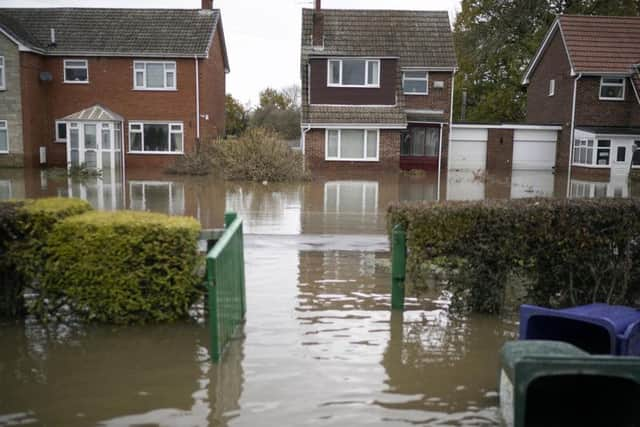Yorkshire floods were a 'once-in-60-years' event say experts, as insurance payouts to victims are expected to reach £110m
The deluge, described by residents in the worst-hit parts of Yorkshire as "almost biblical", resulted in a slew of Environment Agency flood warnings as homes were evacuated, forcing the Government to call a Cobra emergency meeting to deal with the crisis.
Researchers with the Centre for Hydrology and Ecology (CEH) said the 3.1in (77.8mm) of rainfall during a 24-hour period over November 7-8 in Doncaster, which was one of the places badly affected by flooding, was likely to happen only once every 60 years.
Advertisement
Hide AdAdvertisement
Hide AdExperts found the River Don, which burst its banks, set a new peak flow record.


Elsewhere, flooding around the River Derwent exceeded notable weather events in the last 20 years, the CEH said.
Annie Hall, the former high sheriff of Derbyshire, died after she was swept away by the river in Darley Dale, near Matlock.
Nick Reynard, CEH science area head for hydro-climate risks, said: "The amount of rainfall, and precisely where it falls, the land surface and how saturated it is, and the existing flood management schemes are just some of the factors that make the precise nature of each flood hard to predict in detail.
Advertisement
Hide AdAdvertisement
Hide Ad"Land management can play a role in helping to prevent or control flooding, such as the use of floodplains or retention ponds or selected small-scale measures to reduce runoff rates.
28 shocking photos of the flooding in YorkshireMan's body found under flood water in Yorkshire"However, man-made flood defences are still required along with these more 'natural' schemes as a basket of flood management solutions is necessary to better manage flood risk.
"Unfortunately, nothing can be done to prevent flooding everywhere at all times."
Experts said it was "too early" to attribute the flooding to climate change.
Advertisement
Hide AdAdvertisement
Hide AdIt comes as South Yorkshire Police continue work to identify a body found on a road affected by recent floods.
Officers said the man's remains were found in Fordstead Lane near Barnby Dun, in the Doncaster area, on Saturday.
The road, between Barnby Dun and Arksey, was under water for a fortnight after the River Don burst its banks.
The Met Office said more than half a month's worth of rain fell in one day across parts of the UK from Tuesday into Wednesday, with further heavy downpours forecast across the country in the next 24 hours.
Advertisement
Hide AdAdvertisement
Hide AdThe news comes as it was revealed insurance payouts to victims of the recent flooding in swathes of Yorkshire and the Midlands are expected to reach £110 million, according to initial estimates from the Association of British Insurers (ABI).
Emergency payments totalling more than £1.2 million have already been made to help homeowners and businesses in the immediate aftermath of the flooding.
Flood alert in place and weather warning issued after heavy rain hits West YorkshireRenew says future floods could be prevented with investmentThe ABI said at least £680,000 has also been paid so far in rehousing the worst hit in temporary accommodation.
The ABI said its initial estimates show:
- Just over 4,000 flood claims have been received so far - 2,250 relating to flooded homes and businesses and 1,788 to damaged vehicles
Advertisement
Hide AdAdvertisement
Hide Ad- Of the estimated £110 million payouts, £45 million will cover damaged homes and possessions, £58 million will be for business property and stock, with £7.5 million relating to damaged vehicles
- The average household flood claim is likely to be around £31,000, and £70,000 for a flooded business
On average, across all risks, home insurance claims come to £2,200, while commercial policy claims are typically for £11,500.
Mark Shepherd of the ABI said: "Insurers' first priority when the floods struck was to help flooded customers recover from the traumatic experience as quickly as possible.
"Making emergency payments, and arranging alternative temporary accommodation where needed, helped many people cope in the immediate aftermath."